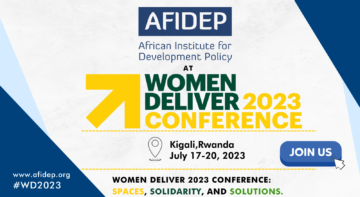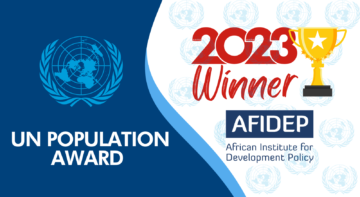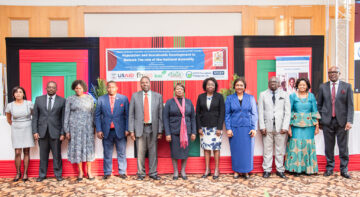News

Malawi’s Minister for Finance, Economic, Planning and Development (MoFEPD) Hon. Goodall Gondwe today presided over the opening of the much anticipated National Population and Development Conference, at the Bingu International Convention Centre (BICC) in Lilongwe.
The Conference, whose theme is Empowering, Educating and Employing Youth to Harness the Demographic Dividend and Achieve Sustainable Development in Malawi, was jointly organised by the MoFEDP, the Ministry of Health (Department of Reproductive Health), the African Institute for Development Policy (AFIDEP) and UNFPA Malawi among other stakeholders.
During the three-day event, which will run till 8th September 2016, delegates and experts, who are drawn from academia, research institutions, government departments, civil society and other stakeholders, will be exploring how Malawi can tap into its large youthful population to reap a demographic dividend. The demographic dividend is the economic benefit that arises from a significant increase in the ratio of working age adults relative to young dependents that results from a decline in birth rates and death rates.
At the start of the Conference, AFIDEP’s Executive Director, Dr. Eliya Zulu, made the keynote address largely informed by findings of a recent study that sought to assess Malawi’s potential to harness a demographic dividend. In Malawi, where young people aged below 35 years constitute 80 percent of the population, a unique opportunity exists to harness a demographic dividend and therefore potentially propel the country to upper middle-income status by 2054.
Dr. Zulu however cautioned that earning a demographic dividend is not automatic. For this socio-economic transformation to be realised, deliberate efforts have to be made through simultaneous investments in the five pillars or “wheels” of the demographic dividend namely: family planning, economic reforms and job creation, health, education and good governance. “As Malawi works to develop its next development strategy, it will be important that this strategy is aligned with the sustainable development goals (SGDs), particularly SGD 4, which emphasises not only education for all but education that is transformative, innovative and well-rounded to ensure learners acquire the skills needed to make them employable and productive adults,” he said. He added that the SGDs are indeed a “demographic dividend framework.”
According to Dr. Zulu, Malawi is fortunate in that the President, H. E. Peter Mutharika, has taken the frontline in embracing the demographic dividend model. He has gone further to be a demographic dividend champion and was influential in having the demographic dividend chosen as the theme of the upcoming 2017 African Union Heads of States Bi-annual Summit.
Speaking at the Conference, the Charge d’affaires of the United States Embassy in Malawi, Mr. Andrew Herrup, agreed that Malawi’s fast-growing population, which could reach 40 million by 2040, needs to be managed in order to reduce pressure on resources and the environment. He expressed his appreciation that the demographic dividend emphasises reduction of population growth rate and equal education opportunities for boys and girls, noting that girls who progress up to secondary school or beyond end up having fewer children who achieve better health and education outcomes.
Further, Mr Herrup called for concerted efforts amongst religious leaders and the family unit to support government efforts to change attitudes on family planning, reproductive health and the role of women in society. “Addressing population growth is not just for government,” he noted. In addition, Mr. Herrup reiterated the need to invest in Malawi’s youth in order for the country to harness a demographic dividend. “Investments in youth can make the difference between poverty and prosperity,” he concluded.
The United Nations Resident Coordinator in Malawi, Ms. Mia Seppo, thanked AFIDEP for offering technical support in undertaking the demographic dividend study in Malawi. “The UN family is pleased to be part of supporting Malawi’s efforts to manage population issues. We expect the launch of the demographic study Report to be followed by concrete action to take this agenda forward, particularly now [that] Malawi is about to develop its next development plan,” she said.
In his remarks, Hon. Gondwe commended the organisers of the Conference for taking a focus on the demographic dividend since the approach considers Malawi’s large youthful population as an opportunity for development rather than a threat. He noted that Malawi had made tremendous progress since 1964 in various spheres of development. He however was in agreement that the high fertility rate in the country has in some instances derailed development efforts by overstretching public resources.
“Listening to the various speakers, it is now clear to me that Malawi’s high fertility rate needs to be managed since it is the highest in the Southern African Development Community (SADC) region. Population pressure sometimes derails development programmes and therefore needs to be controlled,” he observed. Further, the Minister noted that the country has deliberated its development challenges for a long time. “Now it is time to implement change,” he concluded.
The highlight of the Conference was the launching of the Report on a study on the demographic dividend undertaken by the Malawi Government with technical support from AFIDEP. The Report titled: Harnessing the Demographic Dividend to Accelerate Socio-economic Transformation and Economic Development in Malawi was produced with the support of UNFPA Malawi.
It is expected that at the end of the Conference, a Communique’ outlining the key recommendations and action points will be signed by key stakeholders, charting the way to move Malawi towards the adoption of policy actions and implementation of programmes in order to harness a demographic dividend and transform the country.
Related Posts





